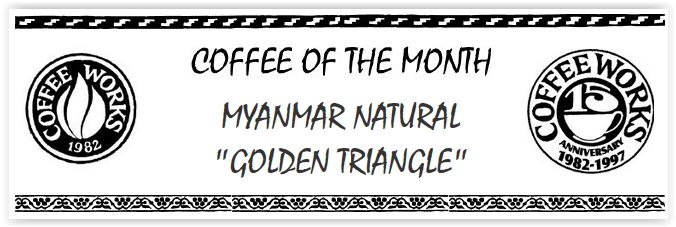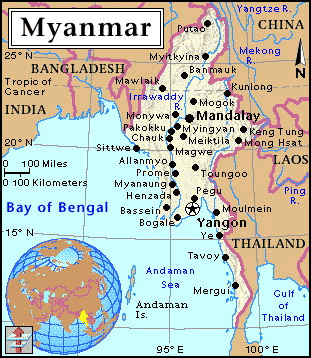Myanmar Natural “Golden Triangle”

The British introduced coffee trees to Burma (now Myanmar) circa 1900. There was a flirt with development in the fifties and sixties, but regional and internal political and economic turmoil left the Myanmar coffee plantations in the stone age of world production. Not good maybe for the central bankers of Myanmar, but oh so perfect conditions for those of us looking for the next source of unspoiled coffee.
We are retro. Small independent roasters like The Coffee Works exist for one and only one fundamental reason: To recreate a taste experience that has captivated the human palate for centuries. Not the insipid, watered-down, sawdust-from-Africa taste of supermarket or pancake-house coffee, but the original, intense, syrop-y, sweet, spicy, and aromatic taste of freshly roasted, mountain grown, tree ripened coffea arabica.
 Like the taste of vine-ripened tomatoes in August. If what you want is the best tasting coffee, few production shortcuts can be justified. Spare us the biotech “advances”, like sun-tolerant, disease resistant, high-yielding, coffee hybrids. Stop mechanizing. Stop technifying. The requirements for producing the best coffee are mostly low-tech and labor intensive, and of course climate and geography.
Like the taste of vine-ripened tomatoes in August. If what you want is the best tasting coffee, few production shortcuts can be justified. Spare us the biotech “advances”, like sun-tolerant, disease resistant, high-yielding, coffee hybrids. Stop mechanizing. Stop technifying. The requirements for producing the best coffee are mostly low-tech and labor intensive, and of course climate and geography.
“The Coffee guys thought they knew where every bean in the world was… But they forgot about Myanmar.” –Gregory Love, Golden Triangle Eco-Resources
Myanmar has it all. The plantations of Myanmar are mostly family owned plots of about 1.5 acres. The main coffee growing areas are Pyin Oo Lwin, Taunggyi, and around Falum, ranging from 3,500 to 6,000 feet above sea level. The entire national production is no more than 3,000 tons per year, making Myanmar one of the smallest producers in the world. The trees grown are of the Bourbon variety, an old variety dating back to the original trees presented to King Louis IVX by the Dutch. Due largely to the dearth of modern infrastructure, and the lack of capital of the growers, it is a 100% natural organic, tree-shaded operation. The farmers of Myanmar know what they have to do to conquer the coffee world, and want to do it.
The Golden Triangle. We were first introduced to Myanmar this spring at a blind tasting of “natural” coffees hosted by a San Francisco bay area broker. The competition was tough: Sumatra Mandheling and Ethiopia Harar Moka, both premium “natural” (dry-processed) coffees like Myanmar. We were blown away, not just by the raw power of this newcomer, but also by the fact that we had never even heard of Myanmar/Burma coffee before. In subsequent cuppings we have been overwhelmed by the effusive flavor saturation, heavy caramelized sugars, and wine-like fruitiness of this brash upstart. If like me you are a lover of natural, handmade coffees, I strongly suggest you not wait to enjoy this unspoiled discovery. If things go as they usually do, it won’t come around again.


